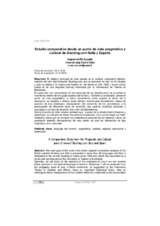Mostrar el registro sencillo del ítem
Estudio comparativo desde un punto de vista pragmático y cultural de Booking.com Italia y España
| dc.contributor.author | Río Zamudio, Sagrario del | |
| dc.date.accessioned | 2019-11-15T12:55:50Z | |
| dc.date.available | 2019-11-15T12:55:50Z | |
| dc.date.issued | 2018 | |
| dc.identifier.issn | 2255-3703 | |
| dc.identifier.uri | http://hdl.handle.net/10396/19123 | |
| dc.description.abstract | El objetivo principal de este trabajo es el análisis contrastivo italiano-español del sitio web holandés Booking.com que se presenta en más de 40 idiomas y que se dedica a la reserva de hoteles en red desde el año 1996 y cuyos inicios fueron el de una pequeña start-up financiada por la Universidad de Twente en Enschede. En particular, nos centraremos en las opiniones de los clientes para ver si podemos inscribirlas dentro del lenguaje especial del turismo. También se analizarán, desde el punto de vista pragmático, si estos comentarios como sugiere la teoría de la relevancia de Sperber y Wilson, tiene efectos contextuales importantes, tomas de posición de tipo ideológico, manipulación del contenido de los comentarios o la provocación de diferentes tipos de emoción, que podrían modificar actitudes y conceptos a la hora de reservar uno u otro establecimiento. Desde el punto de vista cultural veremos que, a pesar de la afinidad entre italianos y españoles, no siempre se tienen las mismas exigencias a la hora de elegir un hotel. Asimismo, dado que se incluyen los comentarios procedentes de América Latina, se analizarán también distinguiendo, de este modo, no solo las diferencias de tipo lingüístico, sino culturales. | es_ES |
| dc.description.abstract | The main goal of this work is the Italian-Spanish contrastive analysis of the Dutch website Booking.com that is presented in more than 40 languages and that is dedicated to the on-line booking of hotels since 1996 and which was launched as a small start-up financed by the University of Twente in Enschede. Specially, we will focus on the opinions of the customers to see if we can inscribe these opinions in the special language of tourism. Moreover, it will be analysed from the pragmatic point of view, if these comments, as suggested by the Relevance Theory of Sperber and Wilson, have an important contextual effect, take an ideological stand, manipulation of the content within the comments or the provocation of different types of emotion which could change attitudes and concepts when we want to reserve one or another location. From the cultural point of view, we will see that, despite the affinity between Italians and Spanish, there aren’t the same requests in the moment of choosing a hotel. At the same time, since there will be some comments from Latin America, they will be analyzed, distinguishing, in this way, not only the linguistic but also the cultural differences. | es_ES |
| dc.format.mimetype | application/pdf | es_ES |
| dc.language.iso | spa | es_ES |
| dc.publisher | UCOPress | es_ES |
| dc.rights | https://creativecommons.org/licenses/by/3.0/ | es_ES |
| dc.source | Skopos 9, 71-87 (2018) | es_ES |
| dc.subject | Lenguaje del turismo | es_ES |
| dc.subject | Pragmática | es_ES |
| dc.subject | Análisis | es_ES |
| dc.subject | Español peninsular y americano | es_ES |
| dc.subject | Language of tourism | es_ES |
| dc.subject | Pragmatics | es_ES |
| dc.subject | Analysis | es_ES |
| dc.subject | Peninsular Spanish and American Spanish | es_ES |
| dc.title | Estudio comparativo desde un punto de vista pragmático y cultural de Booking.com Italia y España | es_ES |
| dc.title.alternative | A Comparative Study from the Pragmatic and Cultural point of view of Booking.com Italy and Spain | es_ES |
| dc.type | info:eu-repo/semantics/article | es_ES |
| dc.relation.publisherversion | https://www.uco.es/ucopress/ojs/index.php/skopos/index | es_ES |
| dc.rights.accessRights | info:eu-repo/semantics/openAccess | es_ES |

